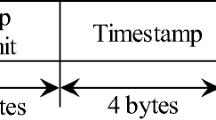Abstract
In today’s world, traffic jams waste hundreds of hours of our life. This causes many researchers try to resolve the problem with the idea of Intelligent Transportation System. For some applications like a travelling ambulance, it is important to reduce delay even for a second. In this paper, we propose a completely infrastructure-less approach for finding shortest path and controlling traffic light to provide absolute priority for an emergency vehicle. We use the idea of vehicular ad-hoc networking to reduce the imposed travelling time. Then, we simulate our proposed protocol and compare it with a centrally controlled traffic light system.
Access this chapter
Tax calculation will be finalised at checkout
Purchases are for personal use only
Preview
Unable to display preview. Download preview PDF.
Similar content being viewed by others
References
Johnson, D., Maltz, D.: Dynamic Source Routing in Ad-Hoc Wireless Networks. In: Proc. ACM SIGCOMM (1996)
Bertsekas, D., Gallager, R.: Data Networks, 2nd edn., p. 401.
Kumar, R., Reddy, D., Singh, V.: Intelligent transport system using GIS, Map India (2003)
Huang, Y.-S.: Design of traffic light control systems using statecharts. The computer journal 49(6) (2006)
Wiering, M., Veenen, J.V., Vreeken, J., Koopman, A.: Intelligent Traffic Light Control. Institute of information and Computing and Science, Utrecht University (2004)
Author information
Authors and Affiliations
Editor information
Editors and Affiliations
Rights and permissions
Copyright information
© 2008 Springer-Verlag Berlin Heidelberg
About this paper
Cite this paper
Shirani, R., Hendessi, F., Montazeri, M.A., Sheikh Zefreh, M. (2008). Absolute Priority for a Vehicle in VANET. In: Sarbazi-Azad, H., Parhami, B., Miremadi, SG., Hessabi, S. (eds) Advances in Computer Science and Engineering. CSICC 2008. Communications in Computer and Information Science, vol 6. Springer, Berlin, Heidelberg. https://doi.org/10.1007/978-3-540-89985-3_142
Download citation
DOI: https://doi.org/10.1007/978-3-540-89985-3_142
Publisher Name: Springer, Berlin, Heidelberg
Print ISBN: 978-3-540-89984-6
Online ISBN: 978-3-540-89985-3
eBook Packages: Computer ScienceComputer Science (R0)




